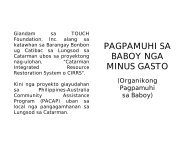2011 Annual Report - PhilDHRRA-Mindanao
2011 Annual Report - PhilDHRRA-Mindanao
2011 Annual Report - PhilDHRRA-Mindanao
You also want an ePaper? Increase the reach of your titles
YUMPU automatically turns print PDFs into web optimized ePapers that Google loves.
Sustainable Agriculture Technology Promotion<br />
<strong>PhilDHRRA</strong> in <strong>Mindanao</strong> through the Intered-<br />
Convenio with funding assistance from the<br />
Agencia Espaňola Cooperación Internacíonal<br />
para el Desarollo (AECID) organized Basic<br />
Orientation on Sustainable Agriculture (BOSSA)<br />
training for the 30 rice farmers of Villapaz<br />
Farmers Multi-Purpose Cooperative (VIFAMCO)<br />
operating in Villapaz, La Paz, Agusan del Sur.<br />
The training aims to enhance the knowledge,<br />
skills and practices of farmers on Sustainable<br />
Agriculture. Apart from the theoretical inputs on<br />
sustainable agriculture technologies, the farmers<br />
were exposed to the technology demonstration<br />
farms showcasing best practices on sustainable<br />
agriculture.<br />
Using the 50 varieties of native rice seeds, the<br />
farmers applied the sustainable rice technology<br />
in the Trial Farm through a “Bayanihan” or<br />
cooperative system. The trial Farm served as a<br />
learning site of the farmers. The farmers were<br />
actually performing the role of a “scientist”, where<br />
they themselves learned and discovered the<br />
growth behavior of the select-rice varieties from<br />
planting to harvesting. The purpose of<br />
establishing the demo farm was to study the<br />
agronomic performance of each rice seeds<br />
variety, i.e. how they would adopt with the<br />
changing climate/environment without using<br />
farm inputs, zero weeding maintenance and in<br />
rainfed condition.<br />
As a result, only 2 out 50 rice varieties showed<br />
p r o m i s i n g p o t e n t i a l s f o r m a s s<br />
propagation. VIFAMCO started to mass produce<br />
the chosen rice seeds varieties, and applied<br />
different sustainable agriculture technologies to<br />
compare, show case and determine which<br />
agricultural technology is best for the types of<br />
rice varieties. One of the major outcomes of the<br />
project was the establishment of a “SEED<br />
BANK” for the chosen rice varieties for<br />
preservation and mass production of “organic<br />
rice”.<br />
In conclusion, sustaining the promotion of<br />
sustainable agriculture technology can be best<br />
achieved when small marginalized farmers are<br />
provided opportunity for better understanding of<br />
their limitations and enabling them to cope with<br />
problems and issues in a manner that is<br />
appropriate to their learning capacity. Farmers<br />
learn more in actual demonstration than<br />
theoretical inputting alone. The “discoverybased”<br />
approach applied in this project is one<br />
concrete example of a very good learning<br />
method.<br />
55<br />
PhilDHRR<br />
MINDANAO A<br />
MINDANAO A<br />
MINDANAO A



